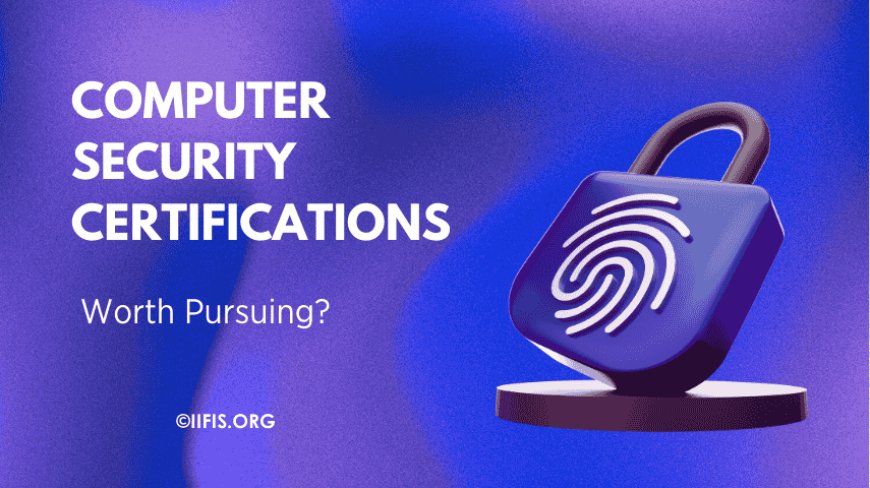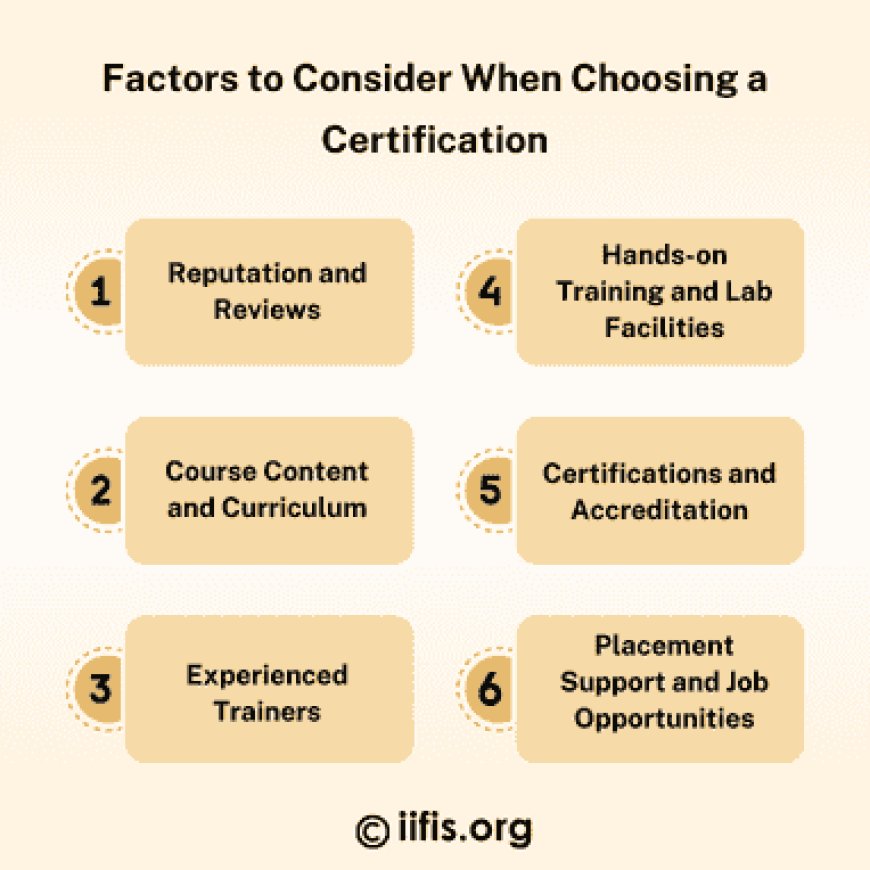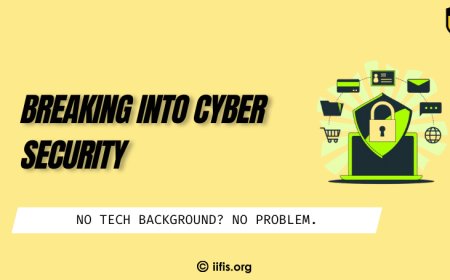Computer Security Certifications Worth Pursuing
Discover the top computer security certifications that can boost your career. Explore certifications like OSCP, CISA, CySA+, and more to find the right fit for your cybersecurity goals.

Computer security certifications have become valuable for anyone looking to enter or advance in the IT security field. Certifications offer hands-on knowledge and a structured path to understanding cybersecurity concepts, tools, and best practices. Whether you're new to cybersecurity or looking to expand your skills, the right certification can open doors to roles in ethical hacking, network defense, or incident response.This blog will guide you through some of the most respected and beneficial certifications, helping you decide which ones align best with your career goals and interests. From foundational certifications like CompTIA Security+ to advanced credentials like CISSP, let’s explore the paths that can help you build a strong and rewarding career in computer security.
Why Computer Security Certifications Matter
The demand for cybersecurity professionals is rising as companies face more digital threats, leading to a major skills gap. This growing field offers strong job opportunities for those with the right certifications.
Key Benefits of Certification
Earning a certification increases job prospects, raises earning potential, and boosts credibility. Employers often seek certified candidates to ensure they have the necessary skills.
Types of Certifications
Certifications range from beginner to advanced and cover various roles. Entry-level options like CompTIA Security+ build foundational skills, while advanced ones like CISSP prepare professionals for management and specialized roles in cybersecurity.
Beginner-Level Certifications
CompTIA Security+
-
Overview: An entry-level certification that introduces essential security concepts.
-
Key Topics: Includes network security, cryptography, access control, and risk management.
-
Ideal For: Individuals starting in IT who want a solid foundation in security.
Certified Ethical Hacker (CEH)
-
Overview: Focuses on ethical hacking fundamentals.
-
Key Topics: Covers penetration testing, vulnerability assessment, and basics of social engineering.
-
Ideal For: Aspiring ethical hackers, security analysts, and IT professionals interested in identifying and addressing security threats.
Intermediate-Level Certifications
Certified Information Systems Security Professional (CISSP)
-
Overview: A widely respected certification for experienced security professionals.
-
Key Topics: Covers risk management, security architecture, software development security, and asset security.
-
Ideal For: Mid-career IT and security professionals looking to move into managerial roles.
Certified Information Security Manager (CISM)
-
Overview: Focuses on information security management and governance.
-
Key Topics: Includes security risk management, program development, and incident management.
-
Ideal For: IT professionals aiming to transition into leadership roles within security teams.
Certified Cloud Security Professional (CCSP)
-
Overview: Specializes in securing cloud environments and services.
-
Key Topics: Covers cloud architecture, data security, and risk management in cloud settings.
-
Ideal For: Security professionals working in or transitioning to cloud-based environments.
Offensive Security Certified Professional (OSCP)
Overview:
OSCP is an ethical hacking certification that focuses on practical, hands-on skills. It's designed to equip professionals with the skills to find and exploit vulnerabilities in real-world scenarios.
Key Topics:
-
Penetration Testing: Identifying and exploiting vulnerabilities within systems.
-
Real-World Exploitations: Working through practical examples and simulations that resemble actual attacks.
-
Vulnerability Discovery: Techniques to discover and assess potential security weaknesses.
Ideal For:
Anyone seeking in-depth, practical skills in ethical hacking, especially for roles requiring hands-on penetration testing capabilities.
Certified Information Systems Auditor (CISA)
Overview:
CISA is a certification for professionals in IT auditing and information system control. It prepares candidates to understand and evaluate the processes and policies governing technology and data security.
Key Topics:
-
Auditing Information Systems: Evaluating IT systems to ensure they function securely and effectively.
-
Compliance and Governance: Ensuring that systems and policies meet industry and regulatory standards.
-
Data and System Protection: Learning how to protect information assets from unauthorized access and risk.
Ideal For:
Security professionals who work in audit and compliance within IT, focusing on security management and control practices.
Certified in Risk and Information Systems Control (CRISC)
Overview:
CRISC certification concentrates on risk management and control in IT systems, equipping professionals with tools to identify and mitigate risks effectively.
Key Topics:
-
Risk Assessment: Understanding, identifying, and evaluating potential risks.
-
Control Implementation: Establishing effective controls to manage identified risks.
-
Risk Monitoring: Ongoing evaluation to ensure that risks are under control and mitigated effectively.
Ideal For:
Professionals in roles related to risk management within IT and security, focusing on assessing and controlling risks in a business environment.
Security Essentials (GSEC)
Overview:
is a certification that covers foundational security skills through a hands-on learning approach. It is designed for those who want to understand essential security practices from a practical standpoint.
Key Topics:
-
Cryptography: Basics of encrypting and protecting information.
-
Incident Handling: Steps to respond to and manage security incidents.
-
Network Security: Techniques to secure networks from threats.
Ideal For:
Professionals who want specialized training in technical security skills and are starting or advancing in their IT security careers.
Cybersecurity Analyst (CySA+)
Overview:
CySA+ focuses on detecting and responding to cybersecurity threats. It prepares individuals to actively monitor and address potential security risks within an organization.
Key Topics:
-
Threat Management: Identifying and evaluating potential security threats.
-
Vulnerability Management: Finding and fixing security weaknesses.
-
Incident Response: Procedures for dealing with security breaches and incidents.
Ideal For:
Analysts responsible for monitoring and managing an organization’s security systems, making it a good choice for those who want to work in a defensive security role.
Systems Security Certified Practitioner (SSCP)
Overview:
SSCP is a certification for hands-on security professionals who want to gain deeper technical knowledge and skills in managing and securing IT environments.
Key Topics:
-
Security Operations: Day-to-day tasks in maintaining and securing systems.
-
Access Controls: Ensuring only authorized users have access to resources.
-
Cryptography: Using encryption to protect data.
Ideal For:
Security practitioners looking to build expertise in technical security practices and manage security operations effectively.
Factors to Consider When Choosing a Certification

Selecting the right certification depends on various personal and professional factors. Here’s what to keep in mind:
Career Goals and Industry Requirements
Choose certifications that align with your career path and the roles you’re aiming for. For example, if you’re interested in ethical hacking, a certification like OSCP might be more relevant, while roles in IT auditing could benefit from CISA.
Certification Difficulty and Prerequisites
Understand the experience level and technical depth each certification requires. Some certifications are entry-level and need no prior experience, while others are advanced and may require years of experience or specific technical skills.
Cost and Time Investment
Certification costs vary widely, and some require a substantial time commitment for study and exam preparation. Make sure to plan your budget and availability for the time it takes to achieve the certification.
Recertification Requirements
Many certifications need periodic renewal, often through exams or continuing education credits. It’s important to know the recertification requirements to maintain the credential over time.
How to Prepare for a Cybersecurity Certification Exam
Preparing for a cybersecurity certification requires planning, practice, and the right study approach. Here’s how to get started:
Self-Study vs. Formal Training Programs
Decide whether to study independently or join a structured program. Online courses and boot camps offer guided training, while self-paced study gives flexibility. Each approach has benefits, so choose one that matches your learning style and schedule.
Practice Exams and Labs
Hands-on practice is key to mastering cybersecurity concepts. Practice exams and labs allow you to work through real-world scenarios, helping you retain knowledge and gain confidence for the test.
Creating a Study Plan
Develop a study plan that breaks down topics into manageable sections. Schedule regular study sessions, track progress, and adjust your plan as needed to stay on track.
Career Impact of Security Certifications
Earning a certification can be a strong career boost, but it’s also part of a bigger picture in cybersecurity.
Certifications vs. Work Experience
Certifications provide valuable knowledge and industry recognition, but they complement hands-on experience rather than replace it. Combining certifications with work experience gives a well-rounded skill set.
Salary and Promotion Potential
Certified professionals often see higher salaries and promotion opportunities. A certification can increase your earning potential and help you advance more quickly in your career.
Building a Long-Term Learning Path
Cybersecurity is a field that requires ongoing learning. Consider additional certifications and specializations over time to deepen your skills and keep up with new developments. This commitment to growth helps sustain long-term career success.
Certifications play a crucial role in building a successful cybersecurity career, providing valuable skills, industry recognition, and pathways to better job opportunities. By earning relevant certifications, you can strengthen your expertise, boost your credibility, and position yourself for career advancement.When choosing a certification, assess your career goals, budget, and available time to find the best fit.
Remember, certifications are just one part of a continuous learning journey in cybersecurity.For more resources on cybersecurity learning or to explore certification courses, check out IIFIS (International Institute of Financial and Information Security). Start your certification journey with IIFIS to gain the skills and knowledge you need to succeed in this exciting field.
























